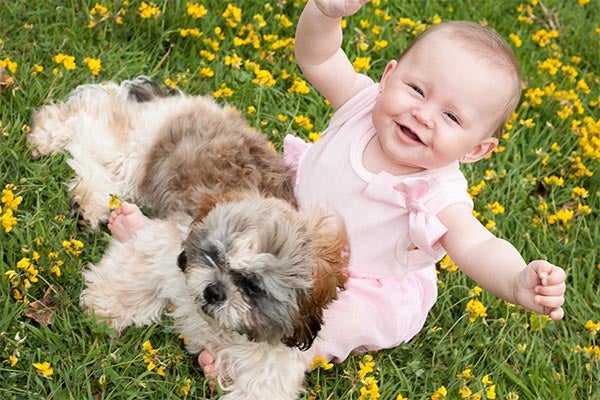The bond that exists between canines and humans is unmistakable (there’s a reason dogs are called “man’s best friend,” after all). They’re adaptable creatures that bond with their human counterparts — and that includes babies.
Like humans, dogs are extremely social creatures. Alexandra Bassett, lead dog trainer and behaviorist at Dog Savvy Los Angeles, says, “All dogs have a mating drive and den instincts; it’s part of what’s called their ‘pack drive.'” When a dog has a strong pack drive and is tightly bonded with his family, it’s only natural that he becomes protective of a new baby when he or she arrives.
Canines are smitten with babies and can form strong connections because of the amount of time spent together. Both a baby and a dog, especially a young pup, have a common desire for a playmate and someone who will give them attention.
The relationship your baby will create with your pup is unique and can have both physical and psychological advantages for their development. One of the most significant benefits is that dogs make babies happy. It’s also been proven that interacting with dogs raises levels of serotonin and dopamine, the chemical building blocks of positive feelings. They’re also just fun to be around.

In addition to the cuteness factor, Caleb Backe, a Pet Health and Wellness Expert for Maple Holistics, says research has shown that babies who grow up with a dog are less likely to develop certain allergies and usually have a more resilient immune system. “When there is a dog around, human babies grow up healthier, more protected, and generally happier,” says Backe.
Another interesting fact: Dogs have feelings too, which enable them to pick up on different cues and subtleties. For example, they can sense that a baby is vulnerable and harmless. You might see a dog sniff or lick a baby’s face or rear end; don’t let this behavior scare you as it’s their way of checking the baby’s health. These are things a mother dog does with her pups.
In addition, canines have heightened, powerful senses thanks to their olfactory glands. A dog’s sense of smell is incredible; he can detect something as minute as the scent of human fingerprints that are a week old. “When a baby is born, the new smells, sights, and sounds are all unique to the dog,” says Russell Hartstein, a certified dog trainer and behaviorist based in L.A. Because changes in a dog’s environment can cause anxiety, it is helpful to prepare your dog for a new arrival or introduce new things slowly.
Every dog should be taught from the beginning to be gentle around a baby. A dog responds to his humans’ verbal cues and body language with an infant. Thus, when owners display a calm, protective demeanor, the dog can learn to be sensitive and cautious. The key to establishing a dog’s protective and trustworthy behavior toward an infant is to begin early with frequent calm socialization and training. If your dog exhibits problems that you feel are beyond your ability to handle, don’t hesitate to seek the help of a professional trainer.
As wonderful and trained as your dog may be, and no matter how much your little one loves your pup, your dog should never be a stand-in babysitter or left alone with an infant.

